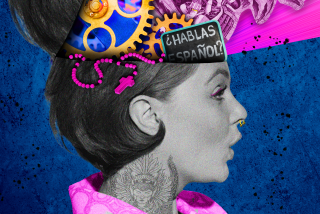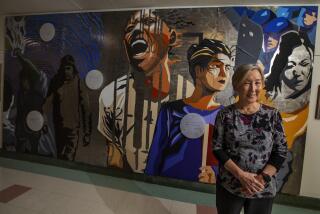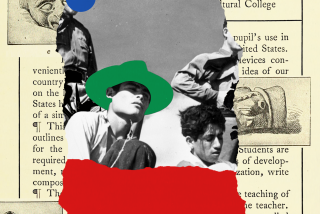Interest in ethnic studies jumps after Arizona ban
TUCSON — Arizona lawmakers passed a law to dismantle a Mexican American studies program in Tucson schools, but the legislation has had an unintended effect: The controversy is renewing interest in the state and nationwide in ethnic studies and Chicano and Latino literature.
Some Tucson students have found new ways to study the subject while receiving college credit to boot. Others who had no interest on the topic say they are now drawn to the material.
“Underground” libraries with Chicano literature are popping up across the Southwest and are set to open soon in unexpected places such as Milwaukee and Louisville.
“I guess the irony is ... that we have banded together and created a new civil rights movement, a renaissance in Latino literature. Now there are people in Louisville, Ky., who will be enjoying Chicano literature,” said Tony Diaz.
Diaz heads Librotraficante, a group that raises money to buy books and open libraries to keep Mexican American studies alive. The state ban was the impetus for Librotraficante — whose name is Spanish for “book smuggler.”
A federal judge this month upheld the law banning the program, which critics said sowed discontent and promoted resentment against non-Latinos. Supporters said the program focused on long-neglected aspects of American history and inspired Latino students to excel in school. The supporters said they would appeal the ruling to the U.S. 9th Circuit Court of Appeals.
Facing financial penalties if they continued the program in defiance of the new state law, trustees of the Tucson Unified School District killed the program last year.
Before the ban, interest in ethnic studies was minimal across the nation, says Sean Arce, who used to head the program.
“After the ban it really has grown exponentially,” he said.
Arce, who was dismissed when the program was discontinued a year ago, says he’s now in demand as a speaker, receiving invitations from various colleges — including Harvard and UCLA — to talk about the importance of ethnic studies. He said a few urban school districts have contacted him about consulting and collaborating on building a curriculum similar to the one outlawed in Tucson.
“We are happy and fortunate to collaborate with these folks because it really is a national issue,” Arce said. “It’s because Latinos are the fastest-growing demographic.”
Raquel Velasquez, a student at Prescott College in Prescott, Ariz., is among the students who say the controversy over the program has drawn them to ethnic studies.
“It was only until it was banned that I really took this seriously and recognized the need,” said Velasquez, a 19-year-old originally from Tucson. She is one of 14 students at Prescott College taking a pedagogy class to help train them to become ethnic studies teachers.
Curtis Acosta, who used to teach mostly Mexican American studies at Tucson High Magnet School and now is relegated to teaching a mainstream English curriculum, says he now looks forward to Sundays. That’s when he teaches a Chicano literature class at John Valenzuela Youth Center in South Tucson.
The idea for a course outside the confines of the school district came to him right before the Mexican American studies program was done away with in his school.
“I couldn’t sit back and watch that happen,” Acosta said. “So right away, the wheels were in motion. I had to do something.”
Now 10 students are enrolled in the Chicano literature class, and Prescott College offers college credit for those enrolled. Acosta and his colleagues also raised enough money to offset all of the students’ tuition costs.
Bianca Sierra said Acosta’s class may be one of the few silver linings to the ban. The 18-year-old is a senior at University High School in Tucson, where Mexican American studies was never offered. Although she had taken a slew of Advanced Placement courses, she’d never had the opportunity to attend a class on Chicano literature.
She says she likes her Sunday class better than her classes at school because she can relate to its subject matter on a personal level. For example, books she reads in her Chicano literature class have characters with names similar to those of her mother and grandmother or mention foods similar to those prepared in her home.
“You can put yourself in their shoes and relate to it more,” she said.
She also enjoys the relaxed atmosphere and format of her Sunday literature class. Instead of simply listening to the teacher lecture, the students gather in a circle and, along with Acosta, discuss and debate the subject matter.
“I like it because it makes me feel more invested in it, because they are asking you, ‘What is your opinion?’ I was never asked what my opinion was on an issue [in class]. You’re just not asked that in regular school,” she said.
More to Read
Start your day right
Sign up for Essential California for news, features and recommendations from the L.A. Times and beyond in your inbox six days a week.
You may occasionally receive promotional content from the Los Angeles Times.







